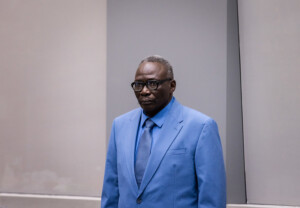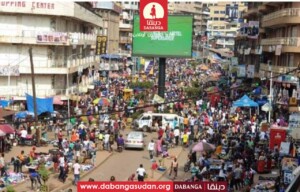US State Department: Sudan should do more to combat human trafficking
The Sudanese government does not fully meet the minimum standards for the elimination of trafficking but is making significant efforts to do so, says the US Department of State in its 2019 Trafficking in Persons report on Sudan.
The government in Khartoum has demonstrated significant efforts during the reporting period by convicting more traffickers, identifying more potential trafficking victims and referring them to services, developing standard operating procedures in partnership with international organizations to identify trafficking victims within vulnerable populations, and training more officials to effectively identify human trafficking.
 Sudan police stop human traffickers transporting Eritrean refugees in eastern Sudan (file photo)
Sudan police stop human traffickers transporting Eritrean refugees in eastern Sudan (file photo)
The Sudanese government does not fully meet the minimum standards for the elimination of trafficking but is making significant efforts to do so, says the US Department of State in its 2019 Trafficking in Persons report on Sudan.
The government in Khartoum has demonstrated significant efforts during the reporting period by convicting more traffickers, identifying more potential trafficking victims and referring them to services, developing standard operating procedures in partnership with international organizations to identify trafficking victims within vulnerable populations, and training more officials to effectively identify human trafficking.
However, the government did not demonstrate overall increasing efforts compared to the previous reporting period, the report states. Government military officials reportedly recruited and provided forged documents for minors to serve as combatants in Yemen.
The government did also not demonstrate efforts to address sex trafficking or identify any sex trafficking victims, and failed to amend its 2014 Anti-Trafficking Law.
Furthermore, the government decreased efforts to prevent trafficking. It did not report developing national awareness campaigns, nor did it make efforts to reduce the demand for commercial sex acts and forced labour.
Sudan is a major transit country for many east African refugees attempting to travel to Europe. In September 2017, Washington added Sudan to the list of countries accused of failing to combat human trafficking – which led to legal restrictions on Sudan for the 2018 fiscal year.
Prosecution
The Ministry of Interior Affairs reported investigating 150 trafficking cases involving an unknown number of suspects in 2018. Thirty of those cases were prosecuted and 45 individual traffickers were convicted under the 2014 Anti-Trafficking Law.
The UN reported the Kassala Anti-Trafficking Court heard 40 trafficking cases in 2018 involving 80 suspects. Kassala government officials convicted 54 traffickers in 24 cases, sentencing them to imprisonment ranging from two and 20 years. Thirty-one of those convicted were Eritreans, and 23 were Sudanese. In August 2018, the government’s Criminal Investigation Department collaborated with Interpol to arrest 14 suspected traffickers in Khartoum. The government did not report the outcomes of those arrests.
The Ministry reported organising 30 trafficking-related trainings for 925 total law enforcement officials in 2018.
The government’s continued denial of sex trafficking occurring in Sudan, coupled with the authorities inconsistent screening of vulnerable populations, likely resulted in officials arresting women whom traffickers forced into prostitution.
Complicit
Experts noted some government officials were complicit in -or otherwise profiting from- trafficking crimes, and the Ministry of Interior Affairs reported investigating two cases involving complicit officials.
In one of the cases, the government reported convicting an unknown number of police officers in Kassala and sentencing them to three years’ imprisonment.
Protection
In 2018, the Interior Ministry reported identifying approximately 1,400 potential trafficking victims, compared with 400 during the previous year. The majority of these potential victims were Eritrean, Ethiopian, and Somalian whose fraudulent labour recruiters lured to Sudan.
In close partnership with an international organization and a foreign government, the government-funded Judicial and Legal Sciences Institute developed and disseminated standard operating procedures in 2018 for the identification of child victims of trafficking.
Yet, the government did not report the extent of dissemination or implementation. Officials discontinued the practice of detaining witnesses to secure their cooperation in trials with the establishment of safe houses in partnership with the UN.
Child soldiers
During the reporting year, the Sudanese authorities continued efforts to prevent the use of child soldiers within the Sudanese Armed Forces (SAF) and its auxiliaries. Unlike previous years, the government did not report identifying or reintegrating any child soldiers in 2018.
Officials coordinated with the UN to conduct monitoring and verification visits, although observers reported security officials intermittently denied access to conflict areas in Darfur.
Media outlets reported government officials recruited children -particularly from Darfur-into combat roles in Yemen.
Exploited
Human traffickers exploit domestic and foreign victims in Sudan, and traffickers exploit victims from Sudan abroad. Traffickers subject homeless children in Khartoum -including Sudanese and unaccompanied migrant children from West and Central Africa- to forced begging, forced labour in public transportation and large markets, and sex trafficking.
Human rights groups observe children working in brick-making factories, gold mining, collecting medical waste, street vending, and agriculture; these children are exposed to threats, physical and sexual abuse, and hazardous working conditions, with limited access to education or health services, making them highly vulnerable to traffickers.
Criminal groups exploit Sudanese women and girls -particularly displaced women or those from rural areas- in domestic work and Sudanese girls to sex trafficking
Because of regional instability and conflict, Sudan hosts approximately 3.3 million people of concern, including more than one million refugees (primarily South Sudanese) and asylum-seekers, and 1.9 million internally displaced people.
Eritreans represented the highest number of trafficking victims in Sudan in 2018. Somalis represent a significant portion of smuggled individuals who become, or are at risk of becoming, victims of trafficking. Traffickers are also exploiting West and Central African nationals, arriving in Sudan via irregular migratory routes, the report concludes.
EU support
In April 2016, the European Union established the EU Emergency Trust Fund for Africa. It contained a development aid package of €100 million aimed to tackle the root causes of instability, irregular migration and displacement in Sudan. Targeted areas were eastern Sudan, Darfur, and South Kordofan and Blue Nile. Another €40 million was appointed to Better Migration Management, supporting the process in Khartoum. An additional amount of €15 million should improve the living conditions of refugees and host communities in eastern Sudan (Kassala) and Khartoum, and strengthen the capacity of local authorities.
International organisations expressed their doubts about the project. The USA-based activist organisation Enough Project warned in April 2017 that EU’s financial support to Sudan for mitigating and combating illegal migration would assist the notorious paramilitary Rapid Support Forces – which the EU denied.
In April 2018, the New York Times pointed to the EU “quietly getting its hands dirty” by outsourcing border management to countries with dubious human rights records. Radio Dabanga reported at the time that the commander of RSF, Gen. Mohamed Hamdan (aka Hemeti) wanted the international community to recognise the efforts of his troops to halt human trafficking.
Two months later, Khartoum and the EU launched a new joint initiative to combat human trafficking and illegal migration in the country.
The Joint Initiative for Migrant Protection and Reintegration for Sudan was signed by the EU, the International Organization for Migration (IOM), the United Nations Migration Agency and the government of Sudan on Thursday in the Sudanese capital.
The three-year initiative received funding through the EU Emergency Trust Fund for Africa and would be implemented by the IOM, with a budget of €45 million for the entire Horn of Africa (Sudan, Ethiopia, Djibouti, Somalia).
Our editorial independence means that we can continue to provide factual updates about ongoing protests to Sudanese and international actors, educate people about how to avoid outbreaks of cholera, and provide a window to the world for those in all corners of Sudan. Support Radio Dabanga for as little as €2.50, the equivalent of a cup of coffee.












 and then
and then